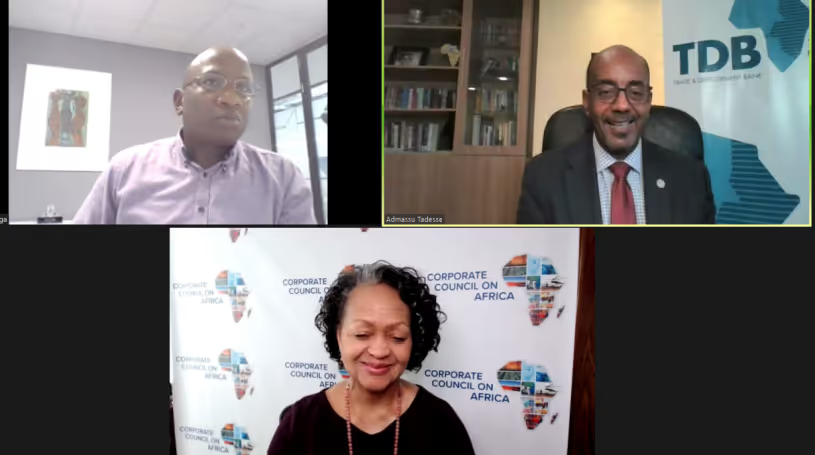Africa Economic Outlook 2022

On Monday, February 21, 2022, Corporate Council on Africa (CCA) held the first session of the Africa Economic Outlook webinar series. The session featured Admassu Tadesse, President Emeritus and CEO of Trade and Development Bank (TDB), and Michael Mutiga, Head of Corporate Finance Africa at Citi. The Africa Economic Outlook webinar series allows CCA to showcase key economic sectors and provide a platform for sector-specific leaders to offer their expert opinions on trade, investment, and business trends in Africa, as well as the challenges countries face as they implement their economic recovery strategies.Opening remarks were provided by Florie Liser, President and CEO of the Corporate Council on Africa. The session served as an opportunity to share trade and investment opportunities on the continent as well as ways that both country economies and companies alike are relaunching following the incredible challenges of 2021.Moderated by Mr. Mutiga, the session covered a variety of topics from the increased appetite for investment of Africans in the diaspora, debt sustainability, and fintech. He began by praising the growth made across the region by TDB under Mr. Tadesse’s leadership, then shifted to questions on trade patterns and prospects for value added exports on the continent.On the subject of trade patterns, which are promoted by trade agreements such as the African Continental Free Trade Area (AfCFTA), Mr. Tadesse stressed the role of Development Finance Institutions (DFIs) such as the Trade Development Bank in their acceleration. With “trade levels growing quite briskly on the continent,” trade patterns reflect Africa’s need for equipment in agriculture, consumption sectors such as merchandise, and infrastructure. DFIs help facilitate this growth and promote local production of goods rather than sourcing from intermediary economies.As Africa accounts for more global trade, the prospects for value added exports on the continent rise as well, creating jobs and promoting industrialization. Mr. Tadesse identified strong priority areas of the automobile industry, agriculture such as blueberries and strawberries, and import substitution with cement, steel, and mining, as well as the increase in transportation efficiency.Topics addressed in the question-and-answer section included ways to connect with TDB using their website and offices in the East African region, the AfCFTA and its potential to lift 30 million Africans out of poverty on the back of economic sustainability, and TDB’s work in the health sector.With pharmaceutical production on the rise, Mr. Tadesse emphasized the increased capacity of countries such as South Africa, Morocco, Ghana, Senegal, Rwanda, and Kenya in vaccine production. He also stressed the need “to expand tertiary health care to provide local, affordable healthcare” rather than Africans leaving the country for medical care. He cited the work of Ethiopian diaspora doctors in building a hospital in Ethiopia as one example of increases in the development of primary health care systems to ensure equitable hospital care.Florie Liser, delivered the closing remarks, emphasizing the role of development finance institutions in creating economic progress and improved connectivity in sub-Saharan Africa. She expressed CCA’s continued mandate to support the economic development of African nations by continuing to provide a platform for discussions on opportunities for investment on the continent as well as U.S.- Africa collaboration for economic growth.



